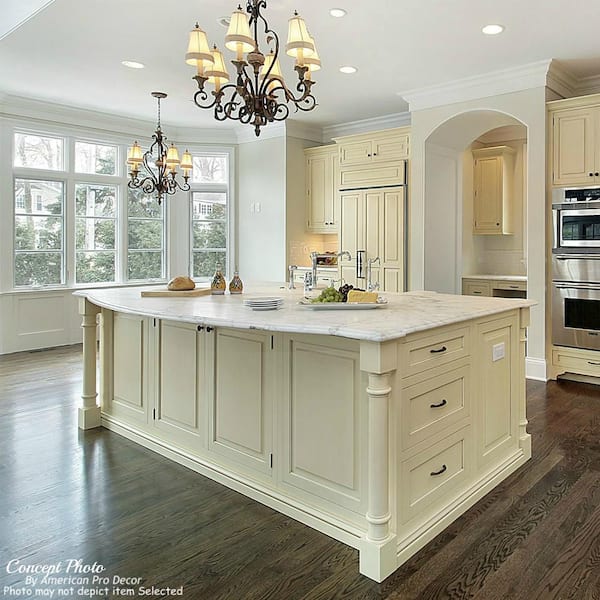A Guide to Choosing the Perfect Legs For Cooking Area Island for Your Home
Picking the excellent legs for your kitchen area island is a nuanced decision that affects both the capability and visual charm of this main area. Aspects such as elevation, materials, and design play a crucial function in balancing your island with the overall kitchen area style. In addition, understanding the relevance of security and maintenance can significantly influence your selection. As you take into consideration these components, it comes to be obvious that the appropriate legs can change not only the appearance of your kitchen but likewise its use for several years to find. What certain functions should you prioritize in this choice process?

Understanding Cooking Area Island Legs
When selecting legs for a kitchen island, it's important to understand their practical and visual functions in the total layout. The legs work as a crucial support group, guaranteeing stability and longevity for the island, which commonly operates as a work area, eating area, or gathering area. For that reason, the selection of material and building technique must be durable sufficient to hold up against daily use and possible wear.
In addition to their structural obligations, legs add significantly to the island's visual charm. They can boost the cooking area's design, whether with traditional, contemporary, or diverse designs. The elevation and proportion of the legs are also essential considerations; they must harmonize with the island's counter top elevation while making sure comfy seating for those using the room.
Moreover, the leg style can influence the overall flow of the cooking area. Open, airy leg styles can create a sense of agility, while solid, considerable legs may share a much more based and stable visual - Legs For Kitchen Island. Recognizing these visual and practical facets will lead property owners in making notified selections that complement their kitchen's design and enhance its functionality
Popular Styles and Materials
The option of legs for a cooking area island includes a range of prominent styles and materials, each offering special qualities that can improve both performance and looks. Among the most sought-after designs are contemporary, rustic, and typical. Contemporary legs typically feature streamlined, minimal layouts that highlight simplicity and clean lines, making them excellent for contemporary kitchens. Rustic designs, on the various other hand, accept natural environments and commonly display recovered wood or troubled finishes, including heat and beauty to the space. Conventional legs normally exhibit elaborate information and workmanship, enhancing traditional cooking area layouts.
:max_bytes(150000):strip_icc()/pink-marble-tile_House-of-Harvee-9f030193ae38484a9cb7ea2d71af66f4.jpg)
Elevation and Security Considerations

The legs of the kitchen area island ought to offer appropriate assistance, making sure that the framework can hold up against everyday use without moving or wobbling. Product choice plays a substantial role in stability; steel legs, for circumstances, often tend to supply better strength contrasted to timber.
Matching Your Cooking Area Aesthetic
Picking the appropriate legs for your kitchen island goes past performance; it also plays a significant function in the general aesthetic of the space (Legs For Kitchen Island). When picking legs, think about the layout style of you can look here your kitchen area.
Shade is an additional vital factor. Legs that complement or comparison with your island's surface area and bordering cabinets can produce aesthetic harmony or striking prime focus. Pairing dark timber legs with a light marble kitchen counter can include depth and passion. In addition, think about the surface of the legs; matte, shiny, or distinctive finishes can significantly affect the total feel of the kitchen area.
Installation and Maintenance Tips
Mounting kitchen island legs needs careful focus to information to ensure both stability and aesthetic allure. Utilize a stud finder to situate wall studs if you are connecting the legs to a wall or making use of brackets for included assistance.
When safeguarding the legs, use high-quality screws and, if necessary, timber glue for added toughness. For steel legs, guarantee that you are utilizing appropriate anchors and devices to stop damage to your flooring. It is a good idea to inspect for levelness after setup, making adjustments as needed to stay clear of wobbling.
Upkeep is equally essential for durability - Legs For Kitchen Island. Regularly examine the legs for any kind of indicators of wear or loosening, specifically in high-traffic locations. Tidy the legs with an ideal cleaner, avoiding rough products that may scratch the surface area. For wood legs, consider using a wood conditioner periodically to preserve their finish. By complying with these installment and maintenance suggestions, you can guarantee that your cooking area island legs remain both visually appealing and functional.
Verdict
To conclude, selecting the proper legs for a kitchen island demands cautious consideration of elevation, stability, resource and aesthetic compatibility. By choosing appropriate materials and designs that line up with the general kitchen area layout, functionality can be enhanced while maintaining visual allure. Appropriate setup and recurring maintenance even more add to the resilience and durability of the cooking area island. Ultimately, thoughtful leg option plays a critical role in raising both the practicality and layout of the kitchen space.
When choosing legs for a kitchen area island, it's necessary to recognize their aesthetic and functional duties in the overall design. Open, airy leg designs can produce a sense of agility, while strong, significant legs might convey an extra grounded and stable aesthetic. The legs of the kitchen island must give adequate assistance, ensuring that the structure can endure day-to-day usage without moving or wobbling.Mounting cooking area island legs requires mindful focus to information to ensure both security helpful site and visual allure.In verdict, picking the proper legs for a kitchen area island demands cautious consideration of height, stability, and visual compatibility.